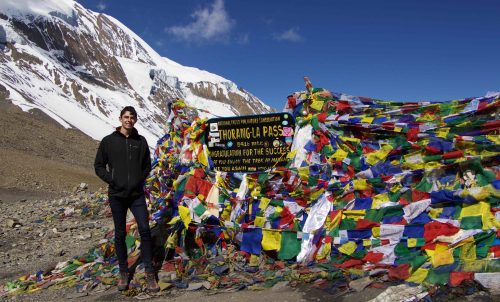Thinking deeply about engineering
Yale College senior Colin Hemez (ES ’18) cherishes long runs, rock-climbing, and sleep. These routines ground Hemez, allowing him to reflect on himself and the world around him. For Hemez, life is not about success or achievement—instead, it’s about thoughtfully exploring problems that are interesting and important. “I really think deeply about what kinds of problems I want to work on, maybe more deeply than I should,” said Hemez. His deep reflection has led him to genome-editing research, a double major in Biomedical Engineering and Art History, and the combined bachelor’s and master’s program through the Yale School of Public Health.
Born in France but raised in New Mexico near Los Alamos National Labs, Hemez was exposed to the world of scientists from an early age. Naturally, during his first year at Yale, he joined the iGEM (International Genetically Engineered Machine) competition team at Yale. As a team, they conducted synthetic biology research and presented their findings at the annual iGEM international Jamboree. More importantly, Hemez got to know one of the team’s sponsors: his future research mentor, Dr. Farren Isaacs, Associate Professor of Molecular, Cellular, and Development Biology.
Since sophomore year, Hemez has been working in Professor Isaacs’ lab at the Systems Biology Institute on Yale’s West Campus. Conventional biology is very bottom-up: it asks how specific molecules, genes, or pieces fit into the bigger picture. However, systems biology is more top-down, using many of the hottest recent developments in biology, including deep sequencing, DNA synthesis, and novel imaging tools to a get a broader view of biology. Very interdisciplinary, systems biology brings together molecular biologists, biomedical engineers, ecologists, and evolutionary biologists.
“What really gets me excited about the work I do in the Isaacs lab is that it’s really at the intersection of basic science and engineering,” Hemez said. Hemez loves the study of science, but at the end of the day, he is an engineer by training. One of his most recent projects is understanding how bacteria whose genetic information isn’t stored in DNA can still interact with normal bacteria that use DNA. He explains that potential applications include engineering gut bacteria that have specific genetic capabilities and do not interact unintentionally with normal bacteria, as bacteria with alternative genetic codes cannot exchange genetic information with other bacterial community members. Not only is Hemez studying biological principles, but he also hopes to use them to better the world.
So how does art history fit into all of this? Hemez’s interest in art history budded when he took an online course in high school. Though Hemez is not necessarily looking to find the intersection of biomedical engineering and art history, the technical analysis he performs in art history has, in turn, informed his scientific pursuits. “The visual stimuli we see around us are hugely influential on the way we make sense of the world. Science is communicated visually,” Hemez said. He hopes that future scientists will strengthen the way science is presented. In art history, he gets a chance to think deeply about specific works, and he believes that, in science, there is something to be gained in slowing down, closely analyzing, and “digesting,” as engineers must understand the motivations and ethics behind the problems they’re facing.
Hemez feels very honored to be a Goldwater Scholar, one of only three Yale students in his class to be given this distinction. He additionally attributes his incredible experience in research to the Beckman Scholars program, which provides research support for eighteen months, an exceptionally long time for a scholarship. “The Beckman Foundation really encourages the scientists they’re funding to dig deep into the problems they’re studying, to take their time with it, to see what comes out of it,” Hemez said. He values the process of deeply exploring science and letting his work evolve organically along various tangents, but he worries that many scientists fear pressure to publish.
Hemez hopes to apply his engineering to solving public health problems, particularly engineering microbial communities that work together to produce medicines, biofuels, and other important natural products. He knows that graduate school is essential to his goals, and could ultimately lead to a faculty position, which he believes would provide unparalleled freedom to work on useful projects that interest him. Hemez feels very grateful to Isaacs and his graduate student mentors, and is often humbled by their brilliance. Whatever Hemez’s future holds for him, he hopes to continue exploring his interests, all while thinking deeply about engineering problems.
References
[1] Interview with Colin Hemez, interview on 1/28/18
[2] https://westcampus.yale.edu/news/yale-undergraduate-colin-hemez-18-named-new-goldwater-scholar?refresh=2
[3] https://science.yalecollege.yale.edu/yale-science-engineering-research/fellowships/beckman-scholars-program

